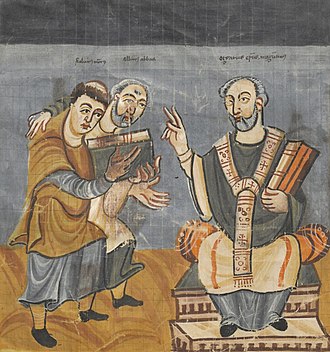Alcuin
Alcuin of York (c. 735 – 19 May 804), also known as Alcuinus of York, was a scholar, teacher, and theologian. He was born in York, Northumbria around the year 735. He was taught at the cathedral school there. He went on to become a prominent figure at the court of Charlemagne in Aachen, where he served as an advisor and educator.
Alcuin was known for his knowledge of literature, history, and religion. He was also known for his work to help people learn throughout the Frankish Empire. He was important in making the Palace School at Aachen. This was a place of intellectual and cultural activity in the Carolingian period.[1]
Alcuin's work in education was very important. He thought teaching children to read and write was important. He helped make a standardized curriculum for schools in Frankish Empire. He also wrote many books on grammar, rhetoric, and religion. These books were widely used in schools in the Middle Ages.
Alcuin also wrote many letters. Many of them have been kept. He wrote letters to Charlemagne and other leading figures of the time.[2]
Alcuin was a Christian.[3] He wrote many theological treatises and poems. He helped make the liturgy of the Roman Catholic Church. He was canonized as a saint in the Roman Catholic Church in the eleventh century. Alcuin died in Tours, France, in the year 804.[4]
Alcuin Media
References
- ↑ Herbermann, Charles George (1907). The Catholic Encyclopedia: An International Work of Reference on the Constitution, Doctrine, Discipline, and History of the Catholic Church. Robert Appleton Company.
- ↑ "Alcuin | Anglo-Saxon scholar". Encyclopedia Britannica. 15 May 2023.
- ↑ Needham, N. (1998). 2,000 Years of Christ's Power. Grace Publications Trust. ISBN 978-0-946462-56-8.
- ↑ Duckett, Eleanor Shipley (1951). Alcuin, Friend of Charlemagne: His World and His Work. Macmillan.

